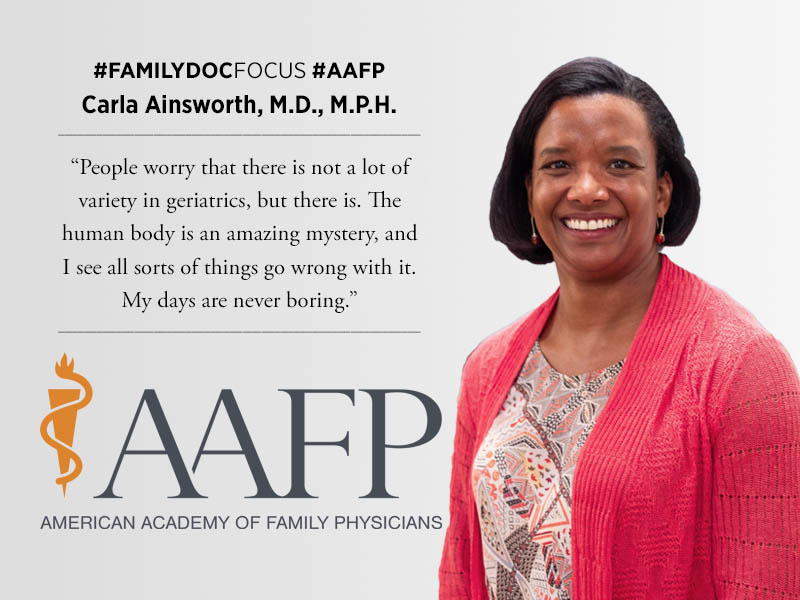Geriatrics FP: ‘It’s hard to imagine anything more satisfying’
June 28, 2021, 3:59 p.m. David Mitchell — Carla Ainsworth, M.D., M.P.H., was a full-scope family physician for 15 years, including more than a decade as faculty at Swedish Family Medicine-First Hill Residency in Seattle. She left that familiar cradle-to-grave setting nearly two years ago to concentrate on a specific segment of the lifespan — geriatrics.

“One of the great things about family medicine is that you can have a lot of interests and find ways to focus on different ones through the course of your career,” said Ainsworth, who was program director at the First Hill residency for four years. “I miss the residency work, but I was ready for a new challenge. I feel confident that as a family doctor I’ll always have more opportunities to reinvent myself and connect with patients and learners and tell the good story of family medicine.”
Ainsworth will do just that July 30 during the virtual National Conference of Family Medicine Residents and Medical Students in a mainstage, storytelling event that features a panel of family physicians who will share their diverse experiences in the specialty.
Ainsworth, who completed a geriatrics fellowship after residency and later served as faculty for the geriatric fellowship program at Swedish Family Medicine, switched her focus from full-scope care to geriatrics in the fall of 2019 — just in time for a pandemic that made older patients especially vulnerable.
“The pandemic has been really hard, particularly for my seniors who live independently,” said Ainsworth, who sees patients in a primary care clinic, during home visits and in assisted living facilities. “They are feeling scared to leave home, but they’re also not sure how to get things they need and are afraid to have people come into their homes. I’ve had patients turn down care that would have helped them. We’ve seen people’s cognition worsen. We’ve seen more depression, anxiety, sadness and grief.”
That doesn’t mean she regrets her decision.
“I like taking care of older patients in part because they have really interesting stories through all their lived experiences, including the way people accumulate their chronic diseases, illnesses and injuries, and the way they respond, show resilience and adapt in the face of challenges,” she said. “It’s incredibly satisfying to understand them in the context of those stories.”
Ainsworth said geriatrics is challenging — and satisfying — because of the complexities and multiple morbidities aging patients present.
“People worry that there is not a lot of variety in geriatrics, but there is,” she said. “The human body is an amazing mystery, and I see all sorts of things go wrong with it. My days are never boring.”
Ainsworth is the care team medical director for Iora Primary Care, which cares for Medicare-eligible patients in a value-based payment model. She said that model has allowed Iora to provide comprehensive care — including advance care planning — for complex patients that is more difficult in a fee-for-service model.
“We were doing phone and video visits before the pandemic because it didn’t matter in terms of our payment,” she said. “The thing that mattered was the outcomes we achieved for patients, like keeping them out of the hospital and helping senior patients and families figure out how to give their loved one the right level of care.”
The median age of Ainsworth’s patient panel is 72. It’s a more “forgiving space” than a traditional practice, she said, because patients’ perspectives and expectations change as they grow older.
“They’ve seen things not work out before, and they know that at the end they may end up dying because we all do,” she said. “The stakes are different, and that allows us to enter our work together differently. If I can bring compassion and keep them at the center of care and engage families in a way that they feel included and involved, it’s incredibly satisfying work. I can help people with a terminal illness die in a way they want and help families understand what’s important to them while they go through that process. It’s sad that people die but to do it the right way, the way they want, it’s hard to imagine anything more satisfying.”
Ainsworth said the right approach is important when caring for an elderly population.
“We have patients die, not infrequently,” she said. “There’s a reality to that when you care for older patients. You have to ask yourself, ‘How do we enjoy the time we spend in people’s lives? How do we show up for them in a way that matters?’ That mindset is helpful for us and makes it easy to get up and come to work every day.”
Ainsworth shares that perspective with students and residents who rotate at her clinic.
“I have specialty colleagues who are helpful to me with procedures and advanced diagnostics, but I can do a lot for my patients,” she said. “I have patients who don’t want to go to a specialist, so I need to make things simpler for them because so many things are getting harder for them. I love being able to say, ‘I can take care of this for you,’ or ‘I can manage that for you,’ in way that is safe and evidence based. I like students and residents to see what a family physician can do.”